by pmdavis | Aug 28, 2024

Horticulture Class Display
It’s hard to believe fair season is just around the corner. I remember as a youth the excitement of entering my projects in the county fair. Today I will be sharing tips for preparing your plant project for exhibition at the fair. At the North Florida Fair, youth plant projects are entered in Class 1 of department 210. This includes plants grown in containers or dish gardens, and each youth can enter up to six entries for this class. Youth need to have their plants six weeks prior to the fair; this year that is around September 15. If you are growing your plant from seed or from a cutting, you will want to start much earlier. The exact time will depend on the type of plant you are growing.
You want to select plants that will peak in November or that can be maintained at a good size for exhibit. Here’s a list of plants that have been exhibited in past years, and work well for this time of year in Florida: African Violet, Aloe, Aluminum, Angelonia, Arrowhead Plant, Basil, Begonia, Blue Daze, Cardinal guard/Mexican Firebush, Coleus, Christmas Cactus, Cilantro, Creeping Jenny, Croton, Cuban Oregano, Dianthus, Dieffenbachia, Dracaena, Crossandra, Jade Plant, Ferns, Fittonia, Ghost Plant, Kalanchoe, Lavender, Liriope, Perilla, Euonymus, Marigold, Moss Rose (Portulaca), Impatiens, Marjoram, Mums, Oregano, Oyster Plant, Orchid, Parsley, Pentas, Peace Lily, Ornamental Peppers, Pentas, Peperomia, Persian Shield, Petunia, Philodendron, Pilea, Polka Dot Plant, Portulaca, Pothos, Prayer Plant, Purple Heart, Rosemary, Sage, Salvia, Sedum, Spider Plant, Snake Plant, Stevia, Tarragon, Thyme, Torenia, Vinca, Wax Begonia, Zinnia.
Caring for your Plant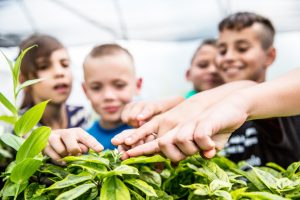
The fantastic thing about exhibiting plants is everyone can grow flowers and vegetables in small spaces using containers. It is also a relatively inexpensive hobby that helps the environment. The main requirement is that you grow plants together with similar light and moisture requirements. Here are a couple of resources to assist you with container gardening from Florida and Iowa.
Plants for exhibition should have good spread, fullness, and height. Branching is often more desirable than extra height. That may mean that the plant needs to be cut back to allow branching and encourage symmetrical growth. A one-sided or unevenly developed plant often indicates that it has not been rotated regularly and has grown toward the sun or source of light.
First decide where your plant will be kept. Is it sunny or shady? Will it get lots of water or a little water? Next select the plants that will meet the location needs. Then find a container to show off your plants for the fair. You want your pot to be in proportion to the plants you planted. You do not want the container to be unstable or overpowering. In our county, we use gallon size black pots for the ease of transport to the fair. However, the fair does not limit or specify the type of container to be used. Talk with your local extension faculty if they are transporting your plants for you since they may have limitations on what they can transport. The biggest thing to remember is the plants are the stars of the show and need to be the eyecatcher, not the container outshining the plants.
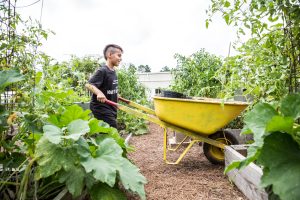 Prepping Your Plant for Exhibition
Prepping Your Plant for Exhibition
After having your plants for six weeks your will need to do a few things to get them ready for exhibit at the fair. Download this checklist to help you prepare!
- You will want to have a saucer to catch water drainage.
- Next clean your pot by removing soil and spray residue from the sides. Remove any excess roots coming out of the bottom of the container. Groom your plant by remove any detritus (dead leaves, sticks etc.) laying on top of the soil. You may need to top dress the container with fresh soil or compost to make it neat in appearance.
- When grooming the plants you want to remove all soil and spray residue from the foliage, stems, and flowers. You can do this by using a damp cloth or soft brush. Be careful not to damage the foliage or petals when doing this step. Next you want to look at the plant for faded blooms, ragged leaves and dead or diseased branches. These should be removed, or trimmed (following the natural shape of the leaf) but stubs or wounds may be noticed by the judge so avoid removing too many leaves and stems.
- If your plant needs to be staked to stand up correctly, stake it but the stake should end below the plant. You want the stake to be as unobtrusive as possible.
- Finally, attach the fair entry tag to your container. Make sure to include the container start date and common plant names to the entry tag or use another label.
Preparing your Entry Form & Exhibitor’s Tag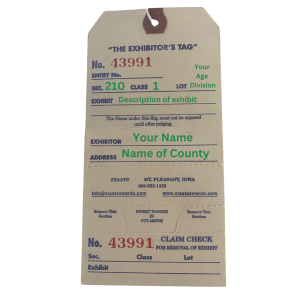
Entry forms are due to your local 4-H Extension Office by the 1st of October. When you turn in your entry form, your 4-H agent will assign exhibit tags, which you will need to fill out and attach to your plant when it is time to submit for judging. Here is the information you need to correctly complete your entry tag:
- Section – 210
- Class- 1
- Lot- This will be your age division; write “A” for juniors (8-10 years old), “B” for intermediates (11-13 years old), or “C” for seniors (14-18 years old).
- Exhibit- a short description of the item you are entering (example: dwarf coreopsis)
- Exhibitor- Your name
- Address- Name of your county
Scoring
Your plant will be judged the Wednesday before the fair opens. Foliage plants are judged on the quality and appearance of leaves and stems. Colors should be bright, clear, and typical of the plant. Flowering plants are judged for their display of flowers but should not show obvious foliage (leaf) damage. A comparison of the number of open flowers and buds is typically used to evaluate similar entries. You can download the judges’ scoring rubric for more information on how horticulture entries are judged. After judging, a ribbon will be attached to your plant, and the ribbon color will be recorded for the fair office so they can issue you your premium money. 4-H Day at the Fair (November 16) is a great time to check to see what placings your exhibits earned!
Take a little time today to dig in the dirt and create your own container garden(s) for fair exhibits. If you have questions, reach out to your local UF IFAS Extension Office.
Resources:
by Heather Kent | Jul 26, 2024
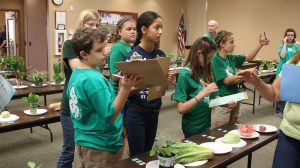 Every year, the North Florida Fair in Tallahassee, FL, becomes a vibrant hub of learning and doing for 4-Hers across North Florida. One of the standout events is the 4-H Horticulture Judging Contest. This contest is more than just a competition; it is a platform for youth to develop essential life and workforce skills. Research indicates that judging contests like the 4-H Horticulture Judging Contest play a significant role in youth development. According to a study by Rusk et al. (2003), participation in judging contests helps youth develop critical thinking, decision-making, and communication skills. These contests require participants to analyze information, make informed decisions, and articulate their reasoning, which are crucial skills for both personal and professional growth.
Every year, the North Florida Fair in Tallahassee, FL, becomes a vibrant hub of learning and doing for 4-Hers across North Florida. One of the standout events is the 4-H Horticulture Judging Contest. This contest is more than just a competition; it is a platform for youth to develop essential life and workforce skills. Research indicates that judging contests like the 4-H Horticulture Judging Contest play a significant role in youth development. According to a study by Rusk et al. (2003), participation in judging contests helps youth develop critical thinking, decision-making, and communication skills. These contests require participants to analyze information, make informed decisions, and articulate their reasoning, which are crucial skills for both personal and professional growth.
Furthermore, a study by Enfield et al. (2007) highlights that judging contests foster a sense of responsibility and self-discipline among participants. The preparation and dedication required for these contests teach youth the value of hard work and perseverance, qualities that are essential for success in any field.
Building Life Skills Through Horticulture Judging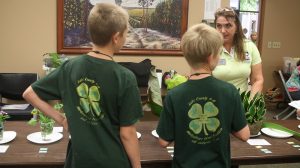
- Critical Thinking and Decision Making:
- Participants must evaluate plants based on a set of criteria, requiring them to apply their knowledge and make informed decisions. This process enhances their critical thinking abilities and helps them become more confident in their judgment.
- Communication Skills:
- After making their evaluations, participants often need to explain their reasoning to judges. This practice helps them develop clear and effective communication skills, which are vital for any career.
- Attention to Detail:
- Identifying subtle differences between plants and recognizing symptoms of diseases or pests requires keen observation and attention to detail. These skills are valuable in numerous professional contexts, including science, healthcare, and business.
- Teamwork and Leadership:
- Many horticulture judging contests involve team events where participants must collaborate and make collective decisions. This experience fosters teamwork and leadership skills, preparing youth for collaborative environments in the workplace.
- Time Management and Organization:
- Preparing for the contest requires effective time management and organizational skills. Participants must balance their study time with other responsibilities, teaching them how to prioritize tasks and manage their time efficiently.
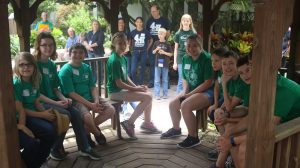 The Impact on Workforce Skills
The Impact on Workforce Skills
The skills developed through horticulture judging contests are directly transferable to the workforce. Employers value employees who can think critically, communicate effectively, and work well in teams. By participating in these contests, youth gain a competitive edge in the job market.
Additionally, the specific knowledge gained through horticulture judging can lead to career opportunities in agriculture, environmental science, and related fields. The experience of participating in such contests can also enhance college applications and resumes, showcasing a commitment to learning and personal development.
Horticulture Judging Contest Content
The 4-H Horticulture Judging Contest challenges participants to evaluate various plant specimens, identify pests and diseases, and demonstrate their knowledge of plant science. The contest is divided into several categories, including plant identification, judging classes based on a set of criteria, and a knowledge exam. This structure not only tests the participants’ horticultural knowledge but also hones their analytical and decision-making skills.
Participants are given a list of plants to study in advance, which can be found on the Florida 4-H Horticulture Contest Study Guide. Additionally, they can access resources on pest identification and management from the University of Florida IFAS Extension.
The 4-H Horticulture Judging Contest at the North Florida Fair is more than a competition; it is a transformative experience that equips youth with essential life and workforce skills. By fostering critical thinking, communication, attention to detail, teamwork, and time management, these contests prepare participants for success in various aspects of life. For more information and resources, participants can refer to the Florida 4-H Horticulture Contest Study Guide and the University of Florida IFAS Extension Pest Management Resources.
As youth engage in these enriching activities, they not only cultivate their horticultural knowledge but also sow the seeds for a prosperous future, embodying the 4-H motto: “To Make the Best Better.” If you are interested in signing your child up for this program, or helping other youth prepare, contact your local UF IFAS Extension office.
References
- Rusk, C. P., Martin, C. A., Talbert, B. A., & Balschweid, M. A. (2003). Attributes of Indiana’s 4-H Livestock Judging Program. Journal of Extension, 41(4).
- Enfield, R. P., Schmitt-McQuitty, L., & Smith, M. H. (2007). The Development and Impact of an Experiential Science Curriculum. Journal of Extension, 45(4).
by Heather Kent | Apr 17, 2024
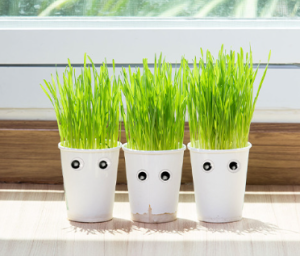 Gardening is not just about growing plants; it’s about nurturing a connection with the earth, fostering a sense of responsibility, and discovering the wonders of nature. For 4-H youth, gardening provides a hands-on learning experience that teaches valuable skills, promotes healthy living, and instills a lifelong appreciation for the environment. After all, 4-H is about helping youth find their spark! In this article, we’ll explore five engaging activities to help 4-H youth develop their green thumbs and cultivate a love for gardening. These activities are perfect for a club meeting, classroom, or even at home with the family!
Gardening is not just about growing plants; it’s about nurturing a connection with the earth, fostering a sense of responsibility, and discovering the wonders of nature. For 4-H youth, gardening provides a hands-on learning experience that teaches valuable skills, promotes healthy living, and instills a lifelong appreciation for the environment. After all, 4-H is about helping youth find their spark! In this article, we’ll explore five engaging activities to help 4-H youth develop their green thumbs and cultivate a love for gardening. These activities are perfect for a club meeting, classroom, or even at home with the family!
- Recycled Plant Pots– Make plant pots out of recycled materials! This is a fun and easy way to make small pots for seed-starting. All you need are some empty water or juice bottles and newspapers. Download the step-by-step directions.
- Paper Towel Gardening– Figuring out how to space seeds when you plant them can be a daunting task. Seed tapes make this easier, but they are expensive. You can make your own while teaching youth about how many plants can fit in a square foot of space. You will need 2-ply paper towels, school glue, a ruler, and seeds. Most full sheets of paper towels are about 1 foot square. You can do the math to determine how many seeds can fit on one paper towel. Once the spacing is determined, gently pull apart the paper towel layers and use a small amount of glue to glue the seeds in place. Place the other layer of paper toweling over the seeds and glue. Once it dries, you can plant the paper towel according to the depth listed on the seed packet. Below are a few common examples:- Bush Beans- 9 seeds per paper towel
– Cucumbers- 2 seeds per paper towel
– Tomatoes- 1 seed per paper towel
- Plant a Plant Person– in a paper cup, or a recycled plant pot from #1 above, plant grass seed. The pot can be decorated to look like a face with googly eyes!
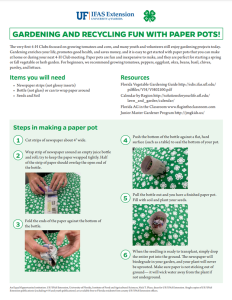 In a few short days, the “plant person” will grow “hair.” The “hair” can be cut with scissors. Step-by-step instructions can be downloaded from Clover by 4-H.
In a few short days, the “plant person” will grow “hair.” The “hair” can be cut with scissors. Step-by-step instructions can be downloaded from Clover by 4-H.
- Planting Party– This activity can double as a service project. Choose a sunny spot at your Extension Office to plant a small herb, vegetable, or flower garden. Work with your Extension office to see if some Master Gardeners might help to demonstrate proper planting techniques, including digging holes, loosening roots, and backfilling with soil. Encourage club members to work together in teams to plant their chosen seedlings, taking turns and offering assistance as needed. Discuss the importance of spacing, watering, and mulching to promote healthy plant growth and prevent competition for resources. As they plant their garden, 4-H youth will develop teamwork skills and a sense of ownership and pride in their collective efforts.
- Garden Journaling: Encourage 4-H youth to keep a garden journal to document their gardening journey and reflect on their experiences. Provide each participant with a notebook or journal and encourage them to record observations, drawings, and notes about their garden activities. Prompt them to write about the plants they’re growing, the weather conditions, any pests or diseases they encounter, and their successes and challenges. Encourage them to take photographs of their garden throughout the growing season to track its progress. Set aside time during club meetings to review and discuss journal entries, share tips and insights, and celebrate achievements. By journaling their experiences, 4-H youth will develop communication skills, critical thinking skills, and a deeper appreciation for the interconnectedness of nature.
Opportunities for further engagement:
If planting seeds and growing them at home, youth can exhibit them at the North Florida Fair in several ways:
- Youth can take photos of their plants and enter it into Class 11. Photos can also be entered in County Events. Blue ribbon photos will move on to 4-H University.
- Youth can enter potted plants or dish gardens in Class 1.
- If harvesting vegetables, youth can enter canned goods in Class 6.
- Youth can create a poster to demonstrate what they learned about gardening (parts of a plant, plant varieties, what plants need to grow, etc). Posters can be entered in Class 12 and can also be entered in County Events. Blue ribbon posters will move on to 4-H University.
- Youth interested in learning more about plants can join a Horticulture Judging Team– the contest takes place on 4-H Day at the Fair on November 9th. The state contest is in June, and the winners go onto the national contest.
Gardening offers endless opportunities for 4-H youth to learn, grow, and connect with the natural world. By engaging in hands-on activities such as seed starting, garden planning, planting parties, journaling, and harvest celebrations, 4-H youth will develop valuable skills, cultivate a love for gardening, and make lasting memories with their peers. So, roll up your sleeves, grab your gardening tools, and let the green thumb adventures begin!
by Heather Kent | Apr 16, 2024
 As the days grow longer and the weather warms up (but isn’t too hot), it’s the perfect time to take your 4-H club activities outdoors! Outdoor activities offer unique opportunities for hands-on learning, team building, and exploration of the natural world. Whether you’re in a rural setting or an urban environment, there are plenty of fun and engaging outdoor activities to enjoy with your 4-H group or as a family. This article shares five ways you can shake things up by taking it outside!
As the days grow longer and the weather warms up (but isn’t too hot), it’s the perfect time to take your 4-H club activities outdoors! Outdoor activities offer unique opportunities for hands-on learning, team building, and exploration of the natural world. Whether you’re in a rural setting or an urban environment, there are plenty of fun and engaging outdoor activities to enjoy with your 4-H group or as a family. This article shares five ways you can shake things up by taking it outside!
Nature Scavenger Hunt: Embark on a nature scavenger hunt to discover the wonders of the great outdoors! Create a list of items for participants to find, such as leaves of different shapes and sizes, animal tracks, bird feathers, or specific types of flowers. Divide the group into teams and set them loose to explore the surrounding area. Encourage participants to use their observation skills and work together to check off items on their list. The team that finds the most items within a designated time wins a prize!
- There is a native plant scavenger hunt as part of the Florida 4-H Bluebird project on page 9 of the Leader’s Guide.
- To make this even more engaging with youth, you can use iNaturalist. It is a free app from National Geographic that uses crowdsourcing to identify plants. You can create your scavenger hunt for your club in the app, and then families or teams of youth use their phone to take a picture, document, and identify plants or animals.
- If youth enjoy this type of activity, you might want to consider the Florida Friendly Landscaping Project or the Florida Youth Naturalist Project. Both projects guide youth through learning about Florida’s native plants and environments.
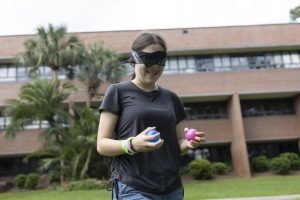 Outdoor Games Day: Organize a fun-filled outdoor games day for your 4-H club members to enjoy friendly competition and physical activity. Set up stations for classic games like sack races, tug-of-war, relay races, and frisbee throwing. You can also introduce lesser-known sports or activities such as disc golf, ultimate frisbee, or orienteering. Tailor the games to accommodate different skill levels and abilities, and encourage teamwork, sportsmanship, and fair play among participants. Don’t forget to provide plenty of water, sunscreen, and snacks to keep everyone energized throughout the day!
Outdoor Games Day: Organize a fun-filled outdoor games day for your 4-H club members to enjoy friendly competition and physical activity. Set up stations for classic games like sack races, tug-of-war, relay races, and frisbee throwing. You can also introduce lesser-known sports or activities such as disc golf, ultimate frisbee, or orienteering. Tailor the games to accommodate different skill levels and abilities, and encourage teamwork, sportsmanship, and fair play among participants. Don’t forget to provide plenty of water, sunscreen, and snacks to keep everyone energized throughout the day!
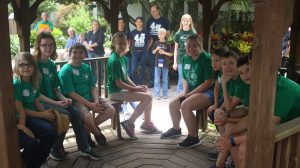 Wildlife Watching: Take a walk on the wild side and explore the fascinating world of local wildlife! Visit nearby parks, nature reserves, or wildlife sanctuaries with your 4-H club and embark on a wildlife-watching adventure. Bring along binoculars, field guides, and notebooks to help identify and record sightings of birds, insects, mammals, reptiles, and amphibians. Encourage participants to observe animal behavior, habitat preferences, and adaptations to their environment.
Wildlife Watching: Take a walk on the wild side and explore the fascinating world of local wildlife! Visit nearby parks, nature reserves, or wildlife sanctuaries with your 4-H club and embark on a wildlife-watching adventure. Bring along binoculars, field guides, and notebooks to help identify and record sightings of birds, insects, mammals, reptiles, and amphibians. Encourage participants to observe animal behavior, habitat preferences, and adaptations to their environment.
- Consider inviting a local naturalist or wildlife expert to join you on your excursion and share their knowledge and expertise with the group.
- Visit a state park to look for signs of wildlife. You can request a letter from your Local UF IFAS Extension Office to waive the state park entry fee.
- Clover by 4-H offers several easy activities to support projects that are grab-and-go. Wildlife Signs is an activity that is appropriate for a variety of ages. This activity helps youth make observations about the wildlife around them, and can be a great introduction to the 4-H Wildlife project! To access the materials, you need to create a free account.
Fostering Further Engagement
Florida 4-H supports several project areas that foster a love of the outdoors. If you know a young person with a spark for the outdoors, encourage them to explore a project related to Wildlife, Forestry, Shooting Sports, or Sportsfishing. We also have a Forest Ecology Contest and a Wildlife Ecology Contest.
With a little creativity and enthusiasm, the possibilities for outdoor activities with your 4-H club are endless! Whether you’re exploring the wonders of nature, , engaging in friendly competition, or observing wildlife in its natural habitat, outdoor activities offer valuable opportunities for learning, growth, and connection. So, grab your sunscreen, put on your hiking boots, and get ready to make lasting memories with your 4-H club members and families in the great outdoors!
You
Write a blog article about 5 activities to teach 4-H youth about gardening
by Marcus Boston Jr. | Apr 26, 2023
Youth shows and fairs provide a valuable opportunity for young people to develop a wide range of life skills. From responsibility and communication to planning and organization, these events offer a unique learning experience that can help young people build important skills for success in all areas of life.
Can a youth’s participation in County fairs and Shows help to develop them into responsible adult? The answer is yes! The Florida 4-H Program seeks to be inclusive to all youth by using a variety of vehicles to teach youth life skills in traditional and non-traditional settings. A recent article in The Journal of Extension by Oregon State professionals found that “having fun” “spending time with friends” and “teamwork” were the highest-rated motivators for youth that participated in fairs.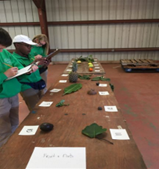
The study also revealed that participation in fairs through 4-H had a significant positive effect on participants’ levels of caring, contribution, and character. These characteristics are also part of the Essential Elements of 4-H that youth experience by being in an active 4-H program throughout the year. Those elements are Belonging, Independence, Generosity, and Mastery.
One of the most important skills that youth learn through participation in youth shows and fairs is responsibility. Whether they are caring for animals, plants, or other projects, youth must take on the responsibility of ensuring that their projects are healthy, well-cared for, and ready to be presented to judges and visitors.
 Communication is another key skill that youth develop through participation in youth shows and fairs. Through active participation youth learn the ability to articulate complex ideas, listen actively, and respond thoughtfully to questions and feedback.
Communication is another key skill that youth develop through participation in youth shows and fairs. Through active participation youth learn the ability to articulate complex ideas, listen actively, and respond thoughtfully to questions and feedback.
In addition to these skills, youth shows, and fairs also emphasize important values such as sportsmanship and fair play. Participants are encouraged to respect their competitors, accept both victories and defeats graciously, and uphold the highest standards of ethical behavior. This helps young people develop important social skills, including the ability to work collaboratively with others and build positive relationships.
Finally, participation in youth shows and fairs can help young people develop resilience and perseverance in the face of challenges and setbacks. These events can be competitive and stressful, but they also offer opportunities for young people to learn from failures, bounce back from disappointments, and remain motivated to achieve their goals.
A few of the Florida 4-H Shows and Fairs are as follows:
-
- State 4-H Dairy Show Okeechobee March
- 4-H Chick Chain Show Chipley April
- Area North Horse Show Green Cove Springs May
- North Florida Fair Tallahassee November
*For additional opportunities to participate in 4-H Shows and fairs please contact your local 4-H office.
In conclusion, participation in youth shows and fairs can offer a unique and valuable learning experience for young people. By developing important skills such as responsibility, communication, planning, and organization, as well as important values such as sportsmanship and fair play, youth can build the foundation for success in all areas of life.
References:
More information on this study can be obtained by visiting the Journal of Extension at www.joe.org and viewing volume 45, number 6.(Arnold, Meinhold, Skubinna, and Asthton)
by Marcus Boston Jr. | Apr 13, 2023
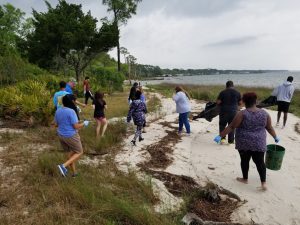 Life skills for youth are defined as a set of abilities and competencies that enable young people to successfully navigate their daily lives and achieve their goals. These skills are essential for personal and professional development and help “prepare youth to be responsible citizens and productive members of the workforce.” Florida 4-H provides many opportunities for young people to obtain life skills through project work, community and afterschool clubs, workshops, and leadership programs.
Life skills for youth are defined as a set of abilities and competencies that enable young people to successfully navigate their daily lives and achieve their goals. These skills are essential for personal and professional development and help “prepare youth to be responsible citizens and productive members of the workforce.” Florida 4-H provides many opportunities for young people to obtain life skills through project work, community and afterschool clubs, workshops, and leadership programs.
As a state-wide organization, Florida 4-H prioritizes the development of communication, higher-order thinking, and appreciation of differences. These three life skills are infused throughout our educational activities and programs because they are essential workforce skills. Below are a few examples of local programs that focus on helping youth develop life skills:
- Communication: 4-H provides opportunities for youth to develop their communication skills through the Florida 4-H Public Speaking Contest, demonstrations, and presentations at County/District and 4-H University. These activities help youth learn how to articulate their ideas clearly and confidently.
- Higher Order Thinking: this includes both decision-making and problem-solving.
- Decision-Making: 4-H offers various programs, such as judging contests at fairs, 4-H event planning committees (district/state council), and club activities that help youth develop their decision-making skills. These activities help youth learn how to make informed decisions and evaluate the outcomes of their choices.
- Problem-Solving: 4-H offers various programs, such as STEM projects and engineering challenges, that help youth develop problem-solving skills. These activities encourage youth to think creatively and find innovative solutions to complex problems.
- Appreciation of Differences– 4-H helps youth learn how to respect and communicate with people who might be different from themselves. Many of our programs offer opportunities for youth to meet new people and explore different cultures. We also help youth learn how to address conflict in a positive way through civil discourse. Older youth can participate in exchange programs with 4-Hers from other states and countries (4-H is in all 50 states and 32 other countries!).
- Teamwork: Through 4-H club projects, counselor training, and community service activities, youth learn how to work collaboratively with others towards a common goal, which helps them develop important teamwork skills.
- Responsibility: 4-H club projects and community service activities encourage youth to take responsibility for their actions and to learn the importance of following through on commitments.
- Leadership Development: 4-H offers various programs, such as officer training, public speaking, county/district councils, and community service projects, that help youth develop their leadership skills.
- Self-Confidence: 4-H programs provide a safe and supportive environment where youth can build their self-confidence through public speaking, leadership roles, and community service activities.
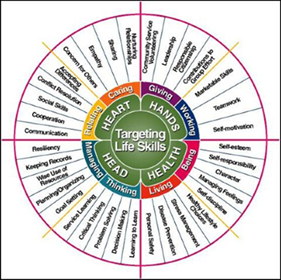
- Service Learning: Through 4-H club work, obtaining a Florida 4-H Community Pride Grant, and active membership on county/district councils, youth members take part in projects and experiences that help them how to become active participants in the communities and apply their experiences to real-life situations.
These are not the only life skills youth in Florida can learn and practice through 4-H- but they are part of almost every program we offer. These are examples of the priority life skills that Florida 4-H promotes among youth, with a focus on cognitive development, interpersonal skills, leadership, civic engagement, and practical skills. Florida 4-H aims to provide a comprehensive youth development program that equips young people with the skills they need to succeed in their personal lives, careers, and communities. Active involvement in 4-H will help members to connect life skills obtained through their 4-H involvement to real-life experiences. For more information on these youth leadership opportunities please contact your local 4-H office.
If you would like to help Florida 4-H teach life skills, or get your child involved in our program, reach out to your local UF/IFAS County Extension Office. There is an office in every county in Florida. Spring is a great time to get involved, because 4-H offers several summer programs for youth to develop life skills!
References:
Marilyn N. Norman and Joy C. Jordan.2018.Targeting Life Skills. EDIS document #4HSFS101.9
Hendricks, P.(1988). Developing Youth Curriculum Using The targeting Life Skills Model
Michigan State Extension. 2016. 4-H Head Life Skill Sheets.(4-H1679)

 Prepping Your Plant for Exhibition
Prepping Your Plant for Exhibition














